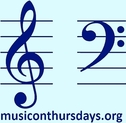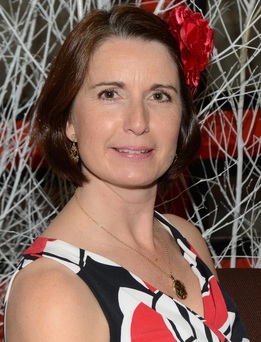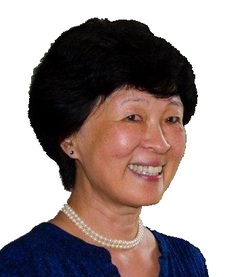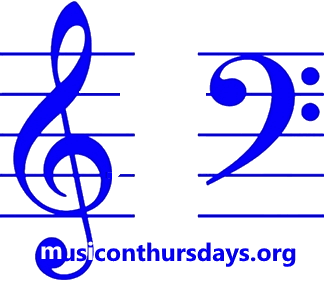Programme
William Boyce (1711-1779) Goddess of the dimpling smile from The Shepherd's Lottery, a Musical Entertainment Henry Purcell (1659-1695) Sweeter than roses Z585 No 1 (1695) from incidental music to "Pausanius, the betrayer of his country" Ralph Vaughan Williams (1872-1958) Silent Noon (1903) from The House of Life, No 2 Martin Shaw (1875-1958) text by Rudyard Kipling Heffle Cuckoo Fair Benjamin Britten (1913-1976) O Waly Waly Come you not from Newcastle ? Madeleine Dring (1923-1977) from Five Betjeman Songs A Bay in Anglesey Song of a Nightclub Proprietress Michael Head (1900-1976) from Five Songs (1938) When sweet Ann sings, text by Margaret Rose (b1936) The Singer, text by Bronnie Taylor John Ireland (1879-1962) I have twelve oxen (1918) Sea Fever (1915) text by John Masefield Ivor Gurney (1890-1937) Thomas Nashe, Summer's Last Will and Testament (1600) Spring |
Lesley Gladigau
|
Lesley Gladigau started training at The Welsh College of Music and Drama, where she sang with the BBC Welsh chorus for 4 years, travelling and performing widely.
She moved to London and studied at the Royal Academy of Music, singing in many music ensembles, concerts and operas. Lesley next worked in Tokyo, singing in concerts at the British and American Embassies. She also spent 2 years in Cairns, Australia, where she performed regularly as a soloist for the Cairns Choral Society. Lesley continues to perform in London and Surrey, singing in many different venues with a varied repertoire. She combines her concert work with teaching singing in several schools. |
Lynda Chang
|
Lynda began learning the piano at the age of 3 with a German nun in Hong Kong. She was formidable (the nun, not Lynda) but gave Lynda an excellent grounding which eventually led to four years’ study at the Royal College of Music in London where she achieved a 1st class honours B.Mus. and was awarded the Tagore gold medal – RCM’s annual nomination for the most outstanding student of the year.
In addition to working with choirs and soloists, Lynda is a regular accompanist for the National Children’s Orchestra’s annual batch of Leverhulme scholars. She also enjoys her collaborations with Carole Boyd from The Archers, jointly performing programmes of words and music on cruises and at corporate / theatrical events. Lynda is accompanist to both the Epsom Male Voice Choir and Mickleham Choral Society. |
Concert at Home
If you cannot be with us at the lunchtime concert
you can enjoy a similar Concert at Home by clicking the buttons below:
you can enjoy a similar Concert at Home by clicking the buttons below:
Here is the text William Boyce set as Goddess of the Dimpling Smile, by anon. We found no online recordings of this song.
Goddess, goddess of the dimpling smile,
Quit, ah! quit thy fav'rite isle:
Crowned with myrtle wreath, advance;
From the hand of giddy chance
Snatch the power to make us blessed.
Be it thine to ease my breast.
In her ivory car the fair queen I behold,
Her cygnets in trappings of purple and gold
Displaying their pinions; I see the young loves,
All brighter than sunshine, all soft as her doves.
With rapture, O Venus, I bow at thy shrine.
She whispers me softly: Young Thyrsis is thine.
In the recording of Purcell's Sweeter than Roses, another anonymous text, the soprano soloist is Jolaine Kerley,
accompanied by Josephine van Lier, baroque cello and, at the harpsichord, Gilbert Martinez.
Sweeter than roses, or cool evening breeze
On a warm flowery shore, was the dear kiss,
First trembling made me freeze,
Then shot like fire all o'er.
What magic has victorious love!
For all I touch or see since that dear kiss,
I hourly prove, all is love to me.
Goddess, goddess of the dimpling smile,
Quit, ah! quit thy fav'rite isle:
Crowned with myrtle wreath, advance;
From the hand of giddy chance
Snatch the power to make us blessed.
Be it thine to ease my breast.
In her ivory car the fair queen I behold,
Her cygnets in trappings of purple and gold
Displaying their pinions; I see the young loves,
All brighter than sunshine, all soft as her doves.
With rapture, O Venus, I bow at thy shrine.
She whispers me softly: Young Thyrsis is thine.
In the recording of Purcell's Sweeter than Roses, another anonymous text, the soprano soloist is Jolaine Kerley,
accompanied by Josephine van Lier, baroque cello and, at the harpsichord, Gilbert Martinez.
Sweeter than roses, or cool evening breeze
On a warm flowery shore, was the dear kiss,
First trembling made me freeze,
Then shot like fire all o'er.
What magic has victorious love!
For all I touch or see since that dear kiss,
I hourly prove, all is love to me.
Next we have Vaughan Williams' setting of Dante Gabriel Rosetti's "Your Hands lie open in the long fresh Grass"
sung by the tenor, Ian Bostridge.
Your hands lie open in the long fresh grass, -
The finger-points look through like rosy blooms:
Your eyes smile peace. The pasture gleams and glooms
'Neath billowing [clouds]1 that scatter and amass.
All round our nest, far as the eye can pass,
Are golden kingcup fields with silver edge
Where the cow-parsley skirts the hawthorn hedge.
'Tis visible silence, still as the hour glass.
Deep in the sun-searched growths the dragon-fly
Hangs like a blue thread loosened from the sky: -
So this winged hour is dropt to us from above.
Oh! clasp we to our hearts, for deathless dower,
This close-companioned inarticulate hour
When two-fold silence was the song of love.
sung by the tenor, Ian Bostridge.
Your hands lie open in the long fresh grass, -
The finger-points look through like rosy blooms:
Your eyes smile peace. The pasture gleams and glooms
'Neath billowing [clouds]1 that scatter and amass.
All round our nest, far as the eye can pass,
Are golden kingcup fields with silver edge
Where the cow-parsley skirts the hawthorn hedge.
'Tis visible silence, still as the hour glass.
Deep in the sun-searched growths the dragon-fly
Hangs like a blue thread loosened from the sky: -
So this winged hour is dropt to us from above.
Oh! clasp we to our hearts, for deathless dower,
This close-companioned inarticulate hour
When two-fold silence was the song of love.
Now a poem of Rudyard Kipling, "Tell it to the locked-up trees", which Martin Shaw set as "Heffle Cuckoo Fair".
A note on Kipling's text states: "Spring begins in Southern England on the 14th April, on which date
the Old Woman lets the Cuckoo out of her basket at Heathfield Fair -- locally known as Heffle Cuckoo Fair"
Tell it to the locked-up trees,
Cuckoo, bring your song here!
Warrant, Act and Summons, please,
For Spring to pass along here!
Tell old Winter, if he doubt,
Tell him squat and square-a!
Old Woman!
Old Woman!
Old Woman's let the Cuckoo out
At Heffle Cuckoo Fair-a!
March has searched and April tried --
'Tisn't long to May now.
Not so far to Whitsuntide,
And Cuckoo's come to stay now!
Hear the valiant fellow shout
Down the orchard bare-a!
Old Woman!
Old Woman!
Old Woman's let the Cuckoo out
At Heffle Cuckoo Fair-a!
When your heart is young and gay
And the season rules it --
Work your works and play your play
Before the Autumn cools it!
Kiss you turn and turn about,
But, my lad, beware-a!
Old Woman!
Old Woman!
Old Woman's let the Cuckoo out
At Heffle Cuckoo Fair-a!
The left button brings a rather fast rendition of Shaw's setting, while the blue button on the right gives a more folk setting of the same text:
A note on Kipling's text states: "Spring begins in Southern England on the 14th April, on which date
the Old Woman lets the Cuckoo out of her basket at Heathfield Fair -- locally known as Heffle Cuckoo Fair"
Tell it to the locked-up trees,
Cuckoo, bring your song here!
Warrant, Act and Summons, please,
For Spring to pass along here!
Tell old Winter, if he doubt,
Tell him squat and square-a!
Old Woman!
Old Woman!
Old Woman's let the Cuckoo out
At Heffle Cuckoo Fair-a!
March has searched and April tried --
'Tisn't long to May now.
Not so far to Whitsuntide,
And Cuckoo's come to stay now!
Hear the valiant fellow shout
Down the orchard bare-a!
Old Woman!
Old Woman!
Old Woman's let the Cuckoo out
At Heffle Cuckoo Fair-a!
When your heart is young and gay
And the season rules it --
Work your works and play your play
Before the Autumn cools it!
Kiss you turn and turn about,
But, my lad, beware-a!
Old Woman!
Old Woman!
Old Woman's let the Cuckoo out
At Heffle Cuckoo Fair-a!
The left button brings a rather fast rendition of Shaw's setting, while the blue button on the right gives a more folk setting of the same text:
Benjamin Britten's well-known setting of the folk-song "O waly waly" (waly = a cry of distress) is sung here
by mezzo-soprano Alexandra Sherman, accompanied by Thomas Steinhöfel
The water is wide I cannot get o'er,
And neither have I wings to fly.
Give me a boat that will carry two,
And both shall row, my love and I.
O, down in the meadows the other day,
A-gathering flowers both fine and gay,
A-gathering flowers both red and blue,
I little thought what love can do.
I leaned my back up against some oak
Thinking that he was a trusty tree;
But first he bended, and then he broke;
And so did my false love to me.
A ship there is, and she sails the sea,
She's loaded deep as deep can be,
But not so deep as the love I'm in:
I know not if I sink or swim.
O! love is handsome and love is fine,
And love's a jewel while it is new;
But when it is old, it groweth cold,
And fades away like morning dew.
by mezzo-soprano Alexandra Sherman, accompanied by Thomas Steinhöfel
The water is wide I cannot get o'er,
And neither have I wings to fly.
Give me a boat that will carry two,
And both shall row, my love and I.
O, down in the meadows the other day,
A-gathering flowers both fine and gay,
A-gathering flowers both red and blue,
I little thought what love can do.
I leaned my back up against some oak
Thinking that he was a trusty tree;
But first he bended, and then he broke;
And so did my false love to me.
A ship there is, and she sails the sea,
She's loaded deep as deep can be,
But not so deep as the love I'm in:
I know not if I sink or swim.
O! love is handsome and love is fine,
And love's a jewel while it is new;
But when it is old, it groweth cold,
And fades away like morning dew.
Felicity Lott clearly enjoys this performance of Come you not from Newcastle for a Japanese audience.
She is accompanied by Graham Johnson.
Come you not from Newcastle?
Come you not there away?
Oh, met you not my true love,
Riding on a bonny bay?
Why should I not love my love?
Why should not my love love me?
Why should I not speed after him,
Since love to all is free?
She is accompanied by Graham Johnson.
Come you not from Newcastle?
Come you not there away?
Oh, met you not my true love,
Riding on a bonny bay?
Why should I not love my love?
Why should not my love love me?
Why should I not speed after him,
Since love to all is free?
The next pair of recordings come from a 2011 concert in St Bride's Church, Fleet Street - the inspiration for the modern wedding cake! Sarah Vivian is the soprano here, with Craig White at the piano, in Madeleine Dring's setting of "A Bay in Anglesey"
The sleepy sound of a tea-time tide
Slaps at the rocks the sun has dried,
Too lazy, almost, to sink and lift
Round low peninsulas pink with thrift.
The water, enlarging shells and sand,
Grows greener emerald out from land
And brown over shadowy shelves below
The waving forests of seaweed show.
Here at my feet in the short cliff grass
Are shells, dried bladderwrack, broken glass,
Pale blue squills and yellow rock roses.
The next low ridge that we climb discloses
One more field for the sheep to graze
While, scarcely seen on this hottest of days,
Far to the eastward, over there,
Snowdon rises in pearl-grey air.
Multiple lark-song, whispering bents,
The thymy, turfy and salty scents
And filling in, brimming in, sparkling and free
The sweet susurration of incoming sea.
And from the same St Bride's concert The Song of a Nightclub Proprietress.
Betjeman called this poem Sun and Fun:
I walked into the night-club in the morning;
There was kummel on the handle of the door.
The ashtrays were unemptied.
The cleaning unattempted,
And a squashed tomato sandwich on the floor.
I pulled aside the thick magenta curtains
-So Regency, so Regency, my dear –
And a host of little spiders
Ran a race across the ciders
To a box of baby ‘pollies by the beer.
Oh sun upon the summer-going by-pass
Where ev’rything is speeding to the sea,
And wonder beyond wonder
That here where lorries thunder
The sun should ever percolate to me.
When Boris used to call in his Sedanca,
When Teddy took me down to his estate
When my nose excited passion,
When my clothes were in the fashion,
When my beaux were never cross if I was late,
There was sun enough for lazing upon beaches,
There was fun enough for far into the night.
But I’m dying now and done for,
What on earth was all the fun for?
For I’m old and ill and terrified and tight.
The sleepy sound of a tea-time tide
Slaps at the rocks the sun has dried,
Too lazy, almost, to sink and lift
Round low peninsulas pink with thrift.
The water, enlarging shells and sand,
Grows greener emerald out from land
And brown over shadowy shelves below
The waving forests of seaweed show.
Here at my feet in the short cliff grass
Are shells, dried bladderwrack, broken glass,
Pale blue squills and yellow rock roses.
The next low ridge that we climb discloses
One more field for the sheep to graze
While, scarcely seen on this hottest of days,
Far to the eastward, over there,
Snowdon rises in pearl-grey air.
Multiple lark-song, whispering bents,
The thymy, turfy and salty scents
And filling in, brimming in, sparkling and free
The sweet susurration of incoming sea.
And from the same St Bride's concert The Song of a Nightclub Proprietress.
Betjeman called this poem Sun and Fun:
I walked into the night-club in the morning;
There was kummel on the handle of the door.
The ashtrays were unemptied.
The cleaning unattempted,
And a squashed tomato sandwich on the floor.
I pulled aside the thick magenta curtains
-So Regency, so Regency, my dear –
And a host of little spiders
Ran a race across the ciders
To a box of baby ‘pollies by the beer.
Oh sun upon the summer-going by-pass
Where ev’rything is speeding to the sea,
And wonder beyond wonder
That here where lorries thunder
The sun should ever percolate to me.
When Boris used to call in his Sedanca,
When Teddy took me down to his estate
When my nose excited passion,
When my clothes were in the fashion,
When my beaux were never cross if I was late,
There was sun enough for lazing upon beaches,
There was fun enough for far into the night.
But I’m dying now and done for,
What on earth was all the fun for?
For I’m old and ill and terrified and tight.
For copyright reasons it seems we cannot offer you the text of Margaret Rose's poem When Sweet Ann Sings. Here then is baritone Kerry Henderson, with pianist Louis Menendez, performing for the Kingston Festival of the Arts 2014, in the Old Dutch Church. What Old Dutch Church , you may ask... this is Kingston New York State... but it is a lovely performance, preceded by the amusing Lone Dog.
Several of today's songs were sung in a concert Miranda Colchester gave in Stockholm, with Ulf Norberg at the piano.
Here is Michael Head's setting of The Singer:
I met a singer on the hill,
He wore a tattered cloak;
His cap was torn,
His shoes were worn,
And dreamily he spoke.
Fa la la la la la ...
Fa la la la la la.
A wrinkled face, a cheery smile,
And a nobby stick had he;
His eyes were grey and far away
And changeful as the sea.
I offered him a piece of gold
And hoped that he would stay.
No word he spoke, but shook his head
And smiled and went his way.
Fa la la la la la ...
La la la la la la.
I watched the singer down the hill.
My eyes went following after,
I thought I heard a fairy flute
And the sound of fairy laughter,
Fa la la la la la... etc.
Here is Michael Head's setting of The Singer:
I met a singer on the hill,
He wore a tattered cloak;
His cap was torn,
His shoes were worn,
And dreamily he spoke.
Fa la la la la la ...
Fa la la la la la.
A wrinkled face, a cheery smile,
And a nobby stick had he;
His eyes were grey and far away
And changeful as the sea.
I offered him a piece of gold
And hoped that he would stay.
No word he spoke, but shook his head
And smiled and went his way.
Fa la la la la la ...
La la la la la la.
I watched the singer down the hill.
My eyes went following after,
I thought I heard a fairy flute
And the sound of fairy laughter,
Fa la la la la la... etc.
Born in Cheshire, despite the name John Ireland does qualify for inclusion in our Thoroughly English Concert.
First here is his setting of the traditional song I have twelve oxen
sung by mezzo-soprano Robin Hendrix, with Michael Prezman at the piano
I have twelve oxen that be fair and brown,
And they go a-grazing down by the town.
[ With hey! with how! with hey!]1
Sawest not you mine oxen, you little pretty boy?
I have twelve oxen, they be fair and white,
And they go a-grazing down by the dyke.
With hey! with how! with hey!
Sawest not you mine oxen, you little pretty boy?
I have twelve oxen, and they be fair and black,
And they go a-grazing down by the lake.
With hey! with how! with hey!
Sawest not you mine oxen, you little pretty boy?
I have twelve oxen, and they be fair and red,
And they go a-grazing down by the mead.
With hey! with how! with hey!
Sawest not you mine oxen, you little pretty boy?
First here is his setting of the traditional song I have twelve oxen
sung by mezzo-soprano Robin Hendrix, with Michael Prezman at the piano
I have twelve oxen that be fair and brown,
And they go a-grazing down by the town.
[ With hey! with how! with hey!]1
Sawest not you mine oxen, you little pretty boy?
I have twelve oxen, they be fair and white,
And they go a-grazing down by the dyke.
With hey! with how! with hey!
Sawest not you mine oxen, you little pretty boy?
I have twelve oxen, and they be fair and black,
And they go a-grazing down by the lake.
With hey! with how! with hey!
Sawest not you mine oxen, you little pretty boy?
I have twelve oxen, and they be fair and red,
And they go a-grazing down by the mead.
With hey! with how! with hey!
Sawest not you mine oxen, you little pretty boy?
We shall stay with Robin Hendrix and Michael Prezman for this performance of John Masefield's poem Sea Fever
I must go down to the seas again, to the lonely sea and the sky,
And all I ask is a tall ship and a star to steer her by,
And the wheel's kick and the wind's song and the white sail's shaking,
And a grey mist on the sea's face and a grey dawn breaking.
I must go down to the seas again, for the call of the running tide
Is a wild call and a clear call that may not be denied;
And all I ask is a windy day with the white clouds flying,
And the flung spray and the blown spume and the seagulls crying.
I must go down to the seas again, to the vagrant gypsy life,
To the gull's way and the whale's way where the wind's like a whetted knife;
And all I ask is a merry yarn from a laughing fellow-rover,
And quiet sleep and a sweet dream when the long trick's over.
I must go down to the seas again, to the lonely sea and the sky,
And all I ask is a tall ship and a star to steer her by,
And the wheel's kick and the wind's song and the white sail's shaking,
And a grey mist on the sea's face and a grey dawn breaking.
I must go down to the seas again, for the call of the running tide
Is a wild call and a clear call that may not be denied;
And all I ask is a windy day with the white clouds flying,
And the flung spray and the blown spume and the seagulls crying.
I must go down to the seas again, to the vagrant gypsy life,
To the gull's way and the whale's way where the wind's like a whetted knife;
And all I ask is a merry yarn from a laughing fellow-rover,
And quiet sleep and a sweet dream when the long trick's over.
Our final song is Ivor Gurney's setting of Spring, a poem from 16th century Thomas Nashe's Summer's Last Will and Testament.
This performance of Five Elizabethan Songs comes from St Anne and St Agnes Church, Gresham Street in the City of London,
sung by counter-tenor Kangmin Justin Kim, with pianist Sachika Taniyama:
Spring, the sweet Spring, is the year's pleasant king;
Then blooms each thing, then maids dance in a ring,
Cold doth not sting, the pretty birds do sing,
Cuckoo, jug-jug, pu-we, to-witta-woo!
The palm and may make country houses gay,
Lambs frisk and play, the shepherds pipe all day,
And we hear aye birds tune this merry lay,
Cuckoo, jug-jug, pu-we, to-witta-woo!
The fields breathe sweet, the daisies kiss our feet,
Young lovers meet, old wives a-sunning sit,
In every street these tunes our ears do greet,
Cuckoo, jug-jug, pu-we, to-witta-woo!
Spring! The sweet Spring!
This performance of Five Elizabethan Songs comes from St Anne and St Agnes Church, Gresham Street in the City of London,
sung by counter-tenor Kangmin Justin Kim, with pianist Sachika Taniyama:
Spring, the sweet Spring, is the year's pleasant king;
Then blooms each thing, then maids dance in a ring,
Cold doth not sting, the pretty birds do sing,
Cuckoo, jug-jug, pu-we, to-witta-woo!
The palm and may make country houses gay,
Lambs frisk and play, the shepherds pipe all day,
And we hear aye birds tune this merry lay,
Cuckoo, jug-jug, pu-we, to-witta-woo!
The fields breathe sweet, the daisies kiss our feet,
Young lovers meet, old wives a-sunning sit,
In every street these tunes our ears do greet,
Cuckoo, jug-jug, pu-we, to-witta-woo!
Spring! The sweet Spring!
Would you like a little encore ? Here's a short piece by Benjamin Britten, sung in St Paul's Church, Covent Garden - The Actors' Church - by mezzo-soprano Marion Olsen and tenor Wills Morgan. Pianist is Nigel Foster. No text this time, it'd spoil the ending!
|
Directions to
Leatherhead Methodist Church |
John Sharples, organ
|
Marios Panteliadis, piano
|














